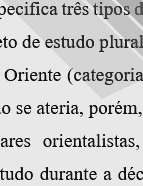

................................
While some historians overweighted socio-economic factors as determinants of historical becoming, others sought to give autonomy to the social and even cultural and political domains. Moreover, while some works placed global historical dynamics at the forefront, others highlighted national specificities.
In the works of Armando Castro, published from the 1940s onwards, the historical process tended to be described as a series of effects - albeit not without mediation - of major socio-economic structures, which thus marked out the field of possibilities of human action. Conceptual formulae such as the mode of production, and their consideration in light of a specific interpretation of the history of the international division of labour and the national issue, took on the role of instruments capable of unveiling the obscure meanings of the past. For example, in his vision of the Portuguese nineteenth century - from which the Salazarist university established a distance (Pina, A Quimera do Ouro [The Gold Chimera], 2003) - Castro considered the particularities of Portugal's economic development (with an emphasis on the attention he vindicated for the persistence of the Antigo Regime [Ancien Regime]) on the one hand; on the other, in an attempt to make these particularities decipherable in the light of international dynamics (Castro, A dominação inglesa [The English Domination], 1972), he made a first contribution to a History of Portugal which was sensitive to the issue of imperialism.
In Victor de Sá's work on nineteenth century Portugal, produced against the backdrop of the 1960s, the socio-economic structures were less enhanced as the determining factor of the historical process. By contrast, Sá tended to pay more attention to the political dynamics associated with the social movements of popular groups, challenged by conceptual formulae such as class struggle. In Sá's case, attention was geared in particular towards urban contexts, as is clear in his pages on Setembrismo [Septemberism], in which the political subject somehow becomes autonomous - also by means of his transnational sensitivity - from the former national context (Sá, A Revolução de Setembro [The September Revolution], 1969). From the 1960s onwards, José Manuel Tengarrinha also focused on analysing rural movements, in this case by crossing the issue of class struggle with the debates surrounding popular politics (Tengarrinha, Movimentos camponeses em Portugal na transição do Antigo Regime para a sociedade liberal [Peasant Movements in Portugal in the Transition from the Ancien Regime to Liberal Society], 1981).
